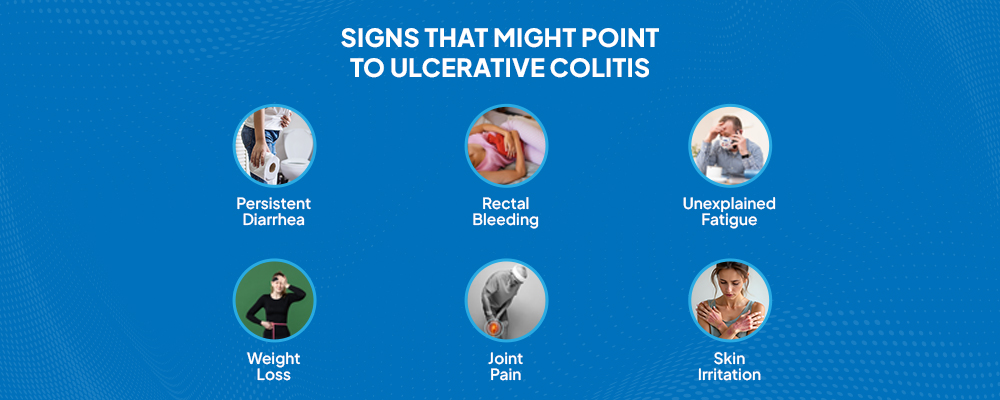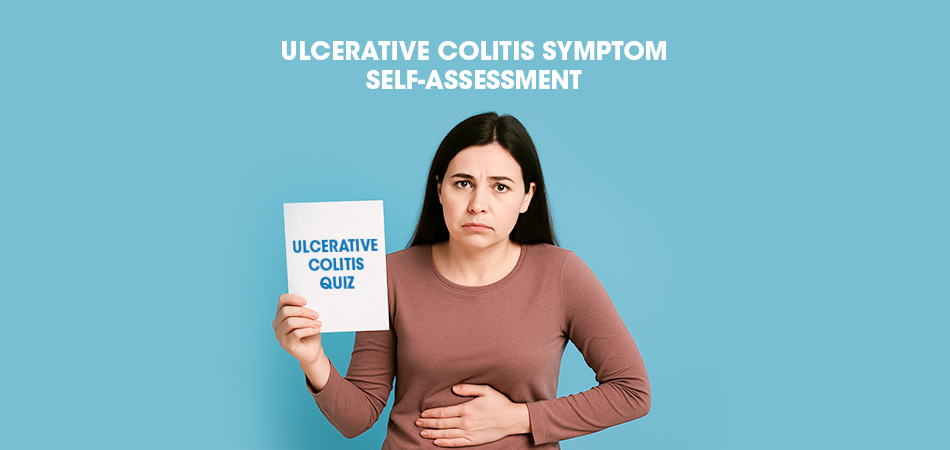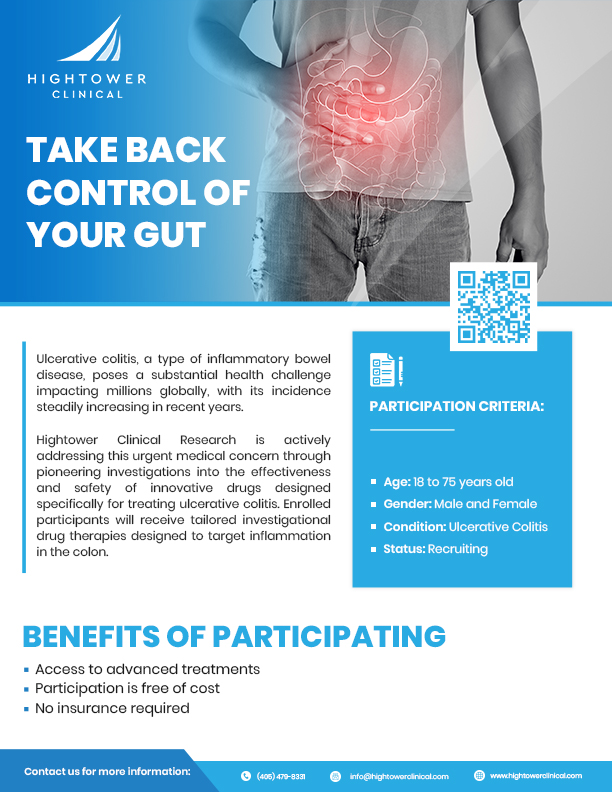“Sometimes stomach pain and frequent bathroom trips feel like more than just a bad meal. Could it be something else? If you’ve been wondering whether your symptoms point to ulcerative colitis, our ulcerative colitis quiz might help guide your next steps.”
What If It’s More Than Just a Stomach Bug?
You’ve had stomach cramps, urgent trips to the bathroom, and maybe even blood in your stool. At first, it might seem like a stomach virus or something you ate. But what if it’s something more serious?
This blog will walk you through what ulcerative colitis could look like—and how to spot the signs early. You’ll also get access to a short ulcerative colitis quiz to help you better understand your symptoms.
By the end, you’ll know what to look out for, what might be going on in your gut, and how clinical trials might offer real options if you’re dealing with UC.
What Is Ulcerative Colitis—and Why Does It Matter?
Ulcerative colitis is a chronic condition that affects your colon and rectum. It causes inflammation and tiny sores inside your digestive tract.
How Does UC Affect Daily Life?
For many, the symptoms come and go. However, they often return without warning.
You might feel tired all the time, even after a full night’s sleep. Or maybe your joints ache, and your stomach feels bloated and painful.
You could also face bathroom urges that are hard to control. This can make workdays, travel, or even short trips stressful.
Why You Shouldn’t Ignore Ongoing Symptoms
Too often, people push off these signs. They blame stress or poor diet. But ignoring symptoms won’t help.
Instead, take our ulcerative colitis quiz to check if your signs match UC patterns. The earlier you know, the faster you can explore care or even join clinical research studies.
Don’t Miss the Signs—It Might Be More Than Stress
Many people shrug off symptoms, thinking they’ll pass. But sometimes, those small signs mean something bigger is going on.
6 Signs That Might Point to Ulcerative Colitis


Persistent Diarrhea
You might think it’s something you ate. However, if it keeps coming back, it may be a red flag.
Rectal Bleeding
Sometimes blood shows up in your stool. Many ignore it. But it could be a sign of colon inflammation.
Unexplained Fatigue
Even after good sleep, you may feel drained. Chronic inflammation can affect your energy levels.
Weight Loss
If the pounds are dropping without effort, your gut may not absorb nutrients properly.
Joint Pain
UC can cause issues beyond the gut. Painful joints and rashes may show up, too.
Skin Irritation
Ulcerative Colitis doesn’t just affect the gut. It can also lead to skin irritation—causing redness, itching, and uncomfortable rashes.
If these sound familiar, the ulcerative colitis quiz below could be helpful.
Self-Check: Take the Ulcerative Colitis Quiz
Sometimes, a quick self-check can help spot patterns. This quiz doesn’t replace a diagnosis. But it can point you in the right direction.
Use this quiz to reflect on your symptoms. Then, talk to a healthcare provider for proper care.
This quiz is automatically created to help you get started. It will be created only once.
Don’t Panic—Here’s What to Do Next
If your quiz score was high, take a breath. You’re not alone, and there are steps you can take.
Next Steps If You Think You May Have UC
- First, schedule a visit with your primary care provider or a GI specialist. They can guide you forward.
- Next, begin tracking your symptoms. Write down when they appear and what seems to trigger them.
- Also, avoid self-diagnosing or changing your diet too quickly. It may do more harm than good.
- Most importantly, don’t wait. Early treatment can reduce symptoms and prevent long-term damage.
- Yes, it can feel overwhelming. But clarity always beats confusion.
- When you act early, you give yourself a better chance at relief and control.
How Hightower Clinical Research Is Helping Patients Like You
You don’t have to figure this out alone. Hightower Clinical Research supports people who may have UC—or already do.
Why Clinical Research Matters for Ulcerative Colitis
Every new study helps improve care. Clinical research looks for better ways to manage real symptoms.
At Hightower, patients explore investigational treatments designed to target gut pain, joint issues, and skin problems.
You Could Help Shape Future Treatments
- When you join a study, you do more than receive care. You also support others facing the same condition.
- Some people join after a diagnosis. Others join because they want more answers about what’s going on.
- Either way, clinical trials may offer access to helpful new options—especially when standard care isn’t enough.
- If you’re curious or newly diagnosed, a study at Hightower could be the next right step.
- You can learn more, ask questions, and see if you qualify—no pressure, just support.
Curious About Clinical Trials? Here’s What You Should Know
Many people feel unsure about clinical trials. That’s okay. The truth is, they’re more simple than you think.
Worried About What It Involves? Let’s Break It Down
- First, you don’t always need a confirmed diagnosis to take part. Many studies accept people still being evaluated.
- Also, you can leave the study at any time. Your health and comfort always come first.
- Most trials provide close medical care. So, you get frequent check-ins and expert support throughout the process.
- Plus, when you take part, you help researchers learn what works. That helps others just like you.
- Clinical trials don’t just test—they care. And they may give you more options than you thought you had.
When Symptoms Mean More Than a Bad Meal
Ulcerative colitis can creep in slowly, disguising itself as stress or a simple stomach bug. But when symptoms linger or worsen, it’s time to start asking questions. This blog helps you spot the early signs of UC and includes a short self-check quiz to guide your next steps.
If you’ve been wondering what’s going on with your gut, now’s the time to find out. Clinical trials at Hightower Clinical Research are helping people like you get answers—and explore new care options.
Noticed the Signs? Here’s When to See a Doctor
If your quiz results raised concern, don’t wait—getting answers early can really help.
What’s the Right Time to Talk to a Doctor?
- First, schedule a visit with a GI specialist. They can check your symptoms and run the right tests.
- Then, take your quiz answers with you. They can help guide the conversation.
- Early care can ease symptoms and stop things from getting worse.
You’re Not Alone—And Help Is Available
Living with unusual gut symptoms can be confusing, but you’re not alone. Ulcerative colitis often develops gradually, and many people overlook the early warning signs. That’s where a UC quiz can help—it encourages the right questions and can guide your next steps toward getting answers. At Hightower Clinical Research, clinical trials are paving the way for more comprehensive care, focusing on treating the whole body, not just the gut. If you’re experiencing symptoms, don’t wait too long to take action. Learn how you can take the next step and join a study with Hightower Clinical Research.





